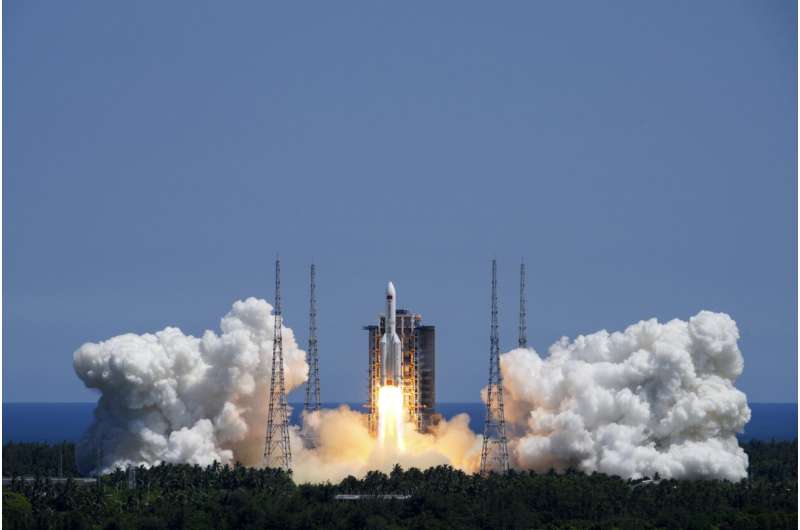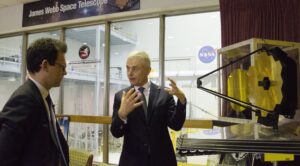China adds science laboratory to its orbiting space station
Monday, 25 July 2022 06:50
Streamlined and ready for Africa’s growth markets: Q&A with Avanti Communications CEO Kyle Whitehill
Monday, 25 July 2022 06:11
SpaceNews spoke with Kyle Whitehill, Avanti’s chief executive officer, to learn more about the British satellite operator’s plans to expand across Africa.
The post Streamlined and ready for Africa’s growth markets: Q&A with Avanti Communications CEO Kyle Whitehill appeared first on SpaceNews.
Second module docks at China’s space station, large rocket stage tracked in orbit
Sunday, 24 July 2022 19:10
China added a new experiment module to its space station Sunday, following a high-profile launch from the country’s coastal spaceport.
China launches one of 2 lab modules to join space station
Sunday, 24 July 2022 16:13
Roman Space Telescope top challenge for new NASA astrophysics director
Sunday, 24 July 2022 13:59
The person tapped to be the next head of NASA’s astrophysics division says his top priority is to keep the agency’s next large space telescope on schedule and within its budget.
The post Roman Space Telescope top challenge for new NASA astrophysics director appeared first on SpaceNews.
China launches second of three space station modules
Sunday, 24 July 2022 06:02 China launched on Sunday the second of three modules needed to complete its new space station, state media reported, the latest step in Beijing's ambitious space programme.
The uncrewed craft, named Wentian, was propelled by a Long March 5B rocket at 2:22 pm (0622 GMT) from the Wenchang launch centre on China's tropical island of Hainan.
Beijing launched the central module of its space s
China launched on Sunday the second of three modules needed to complete its new space station, state media reported, the latest step in Beijing's ambitious space programme.
The uncrewed craft, named Wentian, was propelled by a Long March 5B rocket at 2:22 pm (0622 GMT) from the Wenchang launch centre on China's tropical island of Hainan.
Beijing launched the central module of its space s SpaceX breaks its annual record with 32nd successful launch in 2022
Saturday, 23 July 2022 12:41 SpaceX on Friday broke its annual record with the completion of its 32nd successful launch in 2022, having completed 31 successful launches in 2021.
The company launched 46 Starlink satellites to orbit from a Falcon 9 rocket around 10:39 a.m. from the Space Launch Complex 4 East at Vandenberg Space Force Base in California, SpaceX said in a statement.
Falcon 9's first stage lande
SpaceX on Friday broke its annual record with the completion of its 32nd successful launch in 2022, having completed 31 successful launches in 2021.
The company launched 46 Starlink satellites to orbit from a Falcon 9 rocket around 10:39 a.m. from the Space Launch Complex 4 East at Vandenberg Space Force Base in California, SpaceX said in a statement.
Falcon 9's first stage lande String theory: NASA Mars rover discovers mystery object
Saturday, 23 July 2022 12:41 Is it tumbleweed? A piece of fishing line? Spaghetti?
A tangled object discovered by NASA's Mars Perseverance rover has intrigued space watchers, leaving some musing tongue-in-cheek about the quality of Italian dining on the Red Planet.
But the most plausible explanation is more prosaic: it's likely remnants of a component used to lower the robotic explorer to the Martian surface in Feb
Is it tumbleweed? A piece of fishing line? Spaghetti?
A tangled object discovered by NASA's Mars Perseverance rover has intrigued space watchers, leaving some musing tongue-in-cheek about the quality of Italian dining on the Red Planet.
But the most plausible explanation is more prosaic: it's likely remnants of a component used to lower the robotic explorer to the Martian surface in Feb Hunting for dark galaxies with FAST
Saturday, 23 July 2022 12:41 A large-scale neutral hydrogen (HI) survey of the local universe is one of the major science initiatives under the Five-hundred Meter Aperture Spherical radio Telescope (FAST) project.
Equipped with a 19-beam array receiver and combined with super-high sensitivity owing to its large collection area, FAST is the most powerful survey tool for exploring the HI universe.
The late Prof. N
A large-scale neutral hydrogen (HI) survey of the local universe is one of the major science initiatives under the Five-hundred Meter Aperture Spherical radio Telescope (FAST) project.
Equipped with a 19-beam array receiver and combined with super-high sensitivity owing to its large collection area, FAST is the most powerful survey tool for exploring the HI universe.
The late Prof. N Measuring the Universe with Star-Shattering Explosions
Saturday, 23 July 2022 12:41 An international team of 23 researchers led by Maria Dainotti, Assistant Professor at the National Astronomical Observatory of Japan (NAOJ), has analyzed archive data for powerful cosmic explosions from the deaths of stars and found a new way to measure distances in the distant Universe.
With no landmarks in space, it is very difficult to get a sense of depth. One technique astronomers use
An international team of 23 researchers led by Maria Dainotti, Assistant Professor at the National Astronomical Observatory of Japan (NAOJ), has analyzed archive data for powerful cosmic explosions from the deaths of stars and found a new way to measure distances in the distant Universe.
With no landmarks in space, it is very difficult to get a sense of depth. One technique astronomers use AI-assisted analysis of three-dimensional galaxy distribution in our Universe
Saturday, 23 July 2022 12:41 By applying a machine-learning technique, a neural network method, to gigantic amounts of simulation data about the formation of cosmic structures in the universe, a team of researchers has developed a very fast and highly efficient software program that can make theoretical predictions about structure formation. By comparing model predictions to actual observational datasets, the team succeeded
By applying a machine-learning technique, a neural network method, to gigantic amounts of simulation data about the formation of cosmic structures in the universe, a team of researchers has developed a very fast and highly efficient software program that can make theoretical predictions about structure formation. By comparing model predictions to actual observational datasets, the team succeeded Satellite built by Open Cosmos and RHEA Group to fly on LauncherOne
Saturday, 23 July 2022 12:41 In what will be a mission of firsts, Virgin Orbit (Nasdaq: VORB), has been selected to launch RHEA Group's first satellite into space. The international engineering and solutions firm is working with Open Cosmos to design, build and operate its mission.
Open Cosmos and RHEA have selected Virgin Orbit from its UK business to carry the satellite, DOVER Pathfinder (DOVER), to Low Earth Orbit
In what will be a mission of firsts, Virgin Orbit (Nasdaq: VORB), has been selected to launch RHEA Group's first satellite into space. The international engineering and solutions firm is working with Open Cosmos to design, build and operate its mission.
Open Cosmos and RHEA have selected Virgin Orbit from its UK business to carry the satellite, DOVER Pathfinder (DOVER), to Low Earth Orbit Eutelsat KONNECT VHTS built by Thales shipped to Kourou
Saturday, 23 July 2022 12:41 EUTELSAT KONNECT VHTS satellite, the state-of-the-art and largest satellite ever put into orbit by international operator Eutelsat Communications (Euronext Paris: ETL) is now on its way to Europe's Spaceport in Kourou, French Guiana, by boat, for a launch planned 6 September 2022 on board an Ariane 5 rocket.
EUTELSAT KONNECT VHTS, a very high throughput satellite built by Thales Alenia Spa
EUTELSAT KONNECT VHTS satellite, the state-of-the-art and largest satellite ever put into orbit by international operator Eutelsat Communications (Euronext Paris: ETL) is now on its way to Europe's Spaceport in Kourou, French Guiana, by boat, for a launch planned 6 September 2022 on board an Ariane 5 rocket.
EUTELSAT KONNECT VHTS, a very high throughput satellite built by Thales Alenia Spa The missing link to how galaxies evolve
Saturday, 23 July 2022 12:41 A University of Massachusetts Amherst undergraduate student has contributed significant work regarding the growth of stars and black holes, providing key insight into how they are linked. This new information will allow the James Webb Space Telescope (JWST) to more efficiently untangle how, exactly, galaxies work.
Astronomers know that the evolution of galaxies is powered by two processes:
A University of Massachusetts Amherst undergraduate student has contributed significant work regarding the growth of stars and black holes, providing key insight into how they are linked. This new information will allow the James Webb Space Telescope (JWST) to more efficiently untangle how, exactly, galaxies work.
Astronomers know that the evolution of galaxies is powered by two processes: EO-Lab is Launched - Your Access to Earth Observation Data
Saturday, 23 July 2022 12:41 How can we measure the well-being of our planet Earth? Scientists and researchers in Germany are now offered a new platform for analysing Earth observation satellite data. EO-Lab has been commissioned by the German Space Agency at German Aerospace Centre (Deutsches Zentrum fur Luft- und Raumfahrt; DLR) on behalf of the German Federal Ministry for Economic Affairs and Climate Action.
The ne
How can we measure the well-being of our planet Earth? Scientists and researchers in Germany are now offered a new platform for analysing Earth observation satellite data. EO-Lab has been commissioned by the German Space Agency at German Aerospace Centre (Deutsches Zentrum fur Luft- und Raumfahrt; DLR) on behalf of the German Federal Ministry for Economic Affairs and Climate Action.
The ne 
